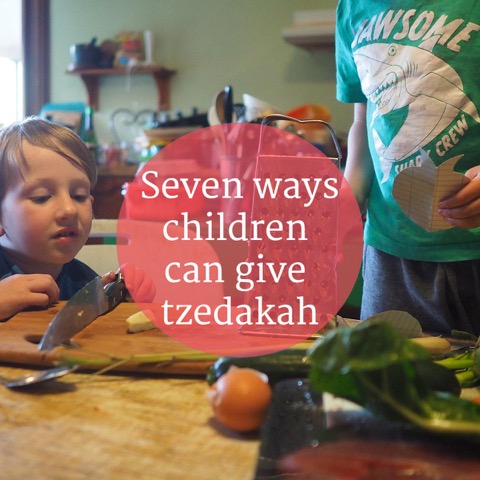
By Talia Carbis of The Climbing Tree
Hands up if as a child, your mother ever told you “You have to eat your dinner. There are children starving in Africa!”, and being the cheeky kid you were you replied, “Well here, they can have my leftovers!”.
Of course, your parents couldn’t bundle up your leftovers to send to Africa, just like you weren’t really being generous in offering it. But what can we do to encourage our children to be generous and kind – to give tzedakah?
Before we can talk too much about ways kids can give tzedakah, we have to clarify what tzedakah is. Tzedakah is about giving & kindness. It is often translated to “charity”, but is actually quite different. Tzedakah is about bringing justice to the world.
Tzedakah should be so well practiced that it is second nature to us.
My hope is that by encouraging and helping my children to do the activities below, they will understand the hurt that lives in our society, and want to use whatever resources, finances and skills they have to bring justice where there is none.
So, without further ado, here is 7 ways kids can give tzedakah:
1. Use their pocket money to give to a charity
The outworking of this will depend on how you manage pocket money in your family, and the age of your kids. Basically you want to encourage your child to add up all their money, and give a certain amount of that to a charity. In Judaism, adults traditionally give 10% of their income to tzedakah. This may be a number you’d like to start with.
My boys love putting money in the tin for the guide dogs at our local fruit shop. Even a small amount makes a difference, and it is great for them to practice giving.
2. Make a meal for a soup kitchen, or family in need
Many soup kitchens require their volunteers to be a certain age before they can help serve food, BUT if you know a soup kitchen near you that accepts food donations, then this is a great thing for your child to get involved in! If not, consider making a meal for someone you know who is sick, or having a baby.
3. Making a gift for a friend
This is just a small act that helps our children realise that their actions have an impact on the people around them. Small children might like to make a drawing, but older children might like do some baking, or craft a handmade gift like a candle or decorate a mug. It’s best if this gift is given for no reason other than friendship!
4. Offer to teach a sibling a new skill
My eldest son is 4, and he gets awfully frustrated with his little brother (he’s 2) who wants to do all the same stuff as him, but doesn’t know how. For this prompt I’m going to ask my eldest son to teach his brother how to do something so that they can play together. It might be teaching him how to make a car out of lego, or how to do a trick on the trampoline.
Giving of ourselves in this way is a really precious gift! An old Jewish proverb says “If you know an aleph, teach an aleph”, and so our children can teach each other the things they know.
5. Give extra toys to charity
I’m always a big fan of this one! I don’t know how my kids just keep accumulating so many toys?! Lots of them are perfectly fine, but they grow out of them, or lose interest. This is a great opportunity to box these toys up and give them to a charity.
6. Find a child at school who’s lonely and sit with them.
Being able to give of ourselves and our time is an important aspect of tzedakah we hope our children will learn quickly and easily. This is a skill even adults struggle with, but once we “get it” and practice it, it can be just as much a gift for ourselves as for the other person.
Instead of sitting their their usual friends at lunch time, encourage your child to look around and see if anyone is on their own. Your child could ask to sit with them, or invite them to join the group.
7. Pick up litter in the park
We want to be caring for our environment as well. God has made us caretakers of this Earth, and we should do our best to keep it clean! Picking up litter in the park is an act of tzedakah that will benefit MANY people, and most will not know who did it. This is another fantastic lesson to learn – we don’t give tzedakah for people to praise us, we give it because it is the right thing to do.
If you’ve enjoyed these tips on how children can give tzedakah, you might want to head on over to The Climbing Tree and read about how parents can give tzedakah to their children!

Trackbacks/Pingbacks